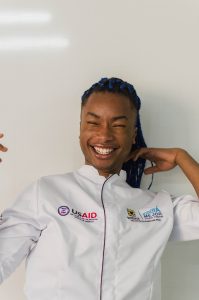
“I never imagined I could find a workplace so welcoming and committed to labor inclusion,” said Willert Moreno (pictured right above), 21, a youth participant of the Program of Alliances for Reconciliation (PAR), funded by USAID and implemented by ACDI/VOCA.
Willert is one of 763 young people from some of Bogotá’s most vulnerable neighborhoods who participated in the Employment for Reconciliation (EPR) program. This workforce development program is a public-private alliance supported by partners like the Bogotá Mayor’s Office, Fundación Texmodas, and Gente Estratégica. Participants like Willert gained skills in marketing, logistics, and customer service through the four-month training, which was followed by a paid internship.

The program used ACDI/VOCA proprietary DecidoSer toolkit, which includes a social change methodology and resources for developing personal skills. The DecidoSer workshops helped participants build trust, respect, and a sense of empowerment, with a strong emphasis on gender and social inclusion. For Willert, this meant allowing him to feel more included as a member of the LGBTQI+ community.
Willert’s journey began in the marginalized city of Quibdó, in Colombia’s Chocó Department, where he was born. He spent his earlier years with his grandmother after his mother left Quibdó to find work in a bigger city. Willert later moved to the capital, Bogotá to be with his mother and enrolled in school to become a nursing assistant. However, he soon dropped out because of financial struggles.
Willert was working in the informal market when he heard about the program and enrolled in the kitchen assistant course. Willert learned the full spectrum of what it means to work in a kitchen, including cooking techniques, restaurant management, hygiene standards, and how to prepare everything from basic dishes to haute cuisine. Colleagues, teachers, and administrators welcomed him and respected his LGBTQI+ identity.
After completing the course, Willert began earning an income through his internship with a restaurant and was able to support himself and his mother financially.
“In the same way that I have learned about food preparation and product display, I have been able to apply the knowledge learned in my classes,” Willert said. “Now my greatest desire is to make a career in the restaurant industry and to alternate this pursuit with another passion: the runway or modeling.”
Check out the full Pride Month blog series:
- Why the Inclusion of LGBTQ+ Populations in Agriculture and Market Systems Matters, Part 1 and Part 2
- Q&A: Experts Discuss Challenges and Opportunities for Collecting LGBTQ+ Data
Learn more about the Program of Alliances for Reconciliation.
Learn more about our work in Colombia.







